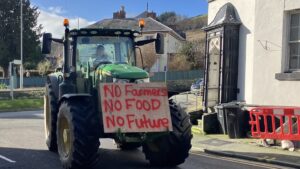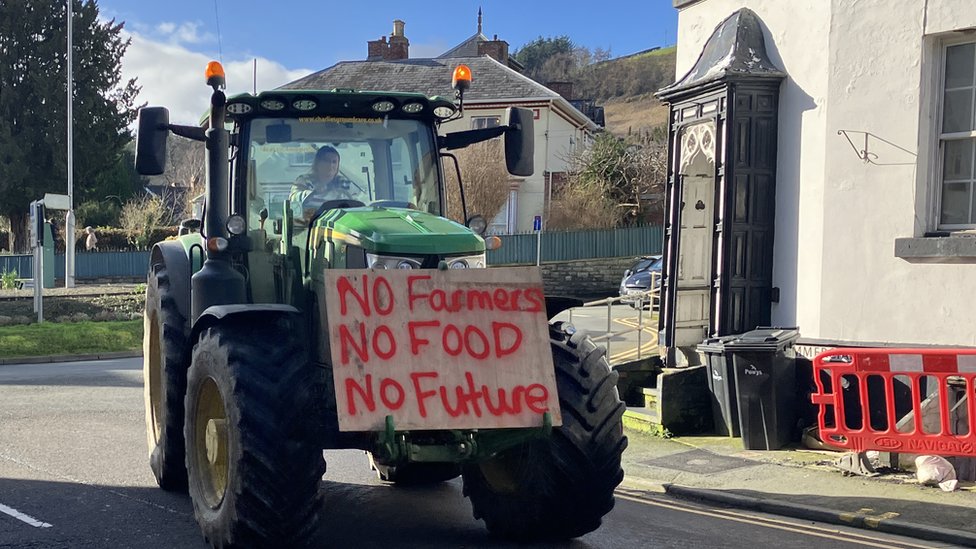By Sean Thompson

In February, Rishi Sunak was accused of pandering to extremists by both farmers and environmental groups in Wales. After speaking at the Welsh Tories’ conference, in a display of brass necked opportunism, he joined a demonstration in Llandudno by some farmers organised by the anti net-zero ‘No Farmers No Food’ campaign against the Welsh Government’s proposed Sustainable Farming Scheme (SFS). The SFS is a new agricultural subsidies scheme designed to meet the Welsh Government’s environmental obligations under UK law and the irony is that the policies the protesters were attacking are similar to the policies Sunak’s government has introduced for England. The main difference is that in Wales, the offer for farmers is somewhat better, with more consistent payments and a smoother transition from the old system.
Rather than the old area based subsidy schemes which provided large farmers, often on more profitable land, with larger subsidies than smaller farmers on poorer land, the Government’s aim is simply to pay farmers for actions that “align with Sustainable Land Management (SLM) objectives including:
- Producing food in a sustainable manner
- Mitigating and adapting to climate change
- Maintaining and enhancing the resilience of ecosystems and the benefits they provide
- Conserving and enhancing the countryside and cultural resources; promoting public access to and engagement with them; and sustaining the Welsh language and promoting and facilitating its use”
Anyone who has actually read the consultation can see that the Welsh government isn’t forcing farmers to do anything. – it is simply proposing changes to the subsidy system. The SFS applies a basic principle, which is also, rhetorically at least, endorsed by the Westminster Government: public money should deliver public goods. None of the conditions it proposes to attach to farm subsidies are unreasonable; all could help to improve the viability and resilience of farm businesses – if properly funded.
Over the past few months the Welsh Government has gone to some lengths to consult as widely as possible with farmers on the proposed structure and implementation of the scheme – all the more commendable as consultation and public engagement is not one of its strong points – and the revised proposals are due to be the subject of even more consultation over the summer. In fact, the fundamental difference between demands of the farmers’ unions (there are two in Wales) and the Welsh Government is the farming lobby’s insistence that the badger cull is resumed in Wales to stop bovine TB: a policy that has repeatedly been shown to make matters worse.
When looked at in detail the SFS, in common with the Basic Payment Scheme and the Rural Development Programme that it will replace (and like most, if not all, agricultural subsidy schemes everywhere) is disconcertingly complex and will doubtless, like other schemes, entail mountains of paperwork. It will have three levels, which it describes as three “actions”.
The first level will be ‘Universal Actions’, 17 mandatory actions that every farmer will need to undertake to receive a “Universal Baseline Payment”. These include activities relating to soil health planning, looking after habitat, improving animal health and welfare, benchmarking and looking after the historic environment. In addition, farmers will have to adhere to two scheme rules: that at least 10% of each farm is managed as habitat and at least 10% under tree cover as woodland or individual trees.
This last condition has been wilfully misinterpreted by sections of the farming lobby, the Tories and the rightwing press to mean an additional 10% of farmland to be taken out of production. In fact it means that where less than 10% of the area of a farm is covered by woodland, the woodland area should be increase to 10%. Since the average tree cover of Welsh farms is somewhere between 7% and 8% the effect will be much less dramatic than the Welsh Tories and the Daily Telegraph claim.
The second level will be ‘Optional Actions’. There will be a menu of activities that farmers will be able to choose from (and be paid for). There is as yet no definitive list of Optional Actions, however it’s likely to include activities like creating new habitat, natural flood management, hosting educational visits and capital support for infrastructure or farm diversification opportunities.
The third level will be ‘Collaborative Actions’. The aim is to give farmers the opportunity to undertake activities at a local, landscape, catchment, or national scale. It aims to “support an increase in collaborative and partnership working between farmers, land managers, foresters, and others.” Examples might include the delivery of nature-based solutions at landscape scale, knowledge transfer in agriculture, the sharing of facilities and resources or exploring new supply chain opportunities.
While the mandatory Universal Actions are well worked out and are due to be introduced in a transition period between 2025-29, the details of Optional and Collaborative Actions have yet to be finalised and are unlikely to be introduced until towards the end of the transitional period.
However, while the current protests are uninformed, reactive, based on misleading information (and downright lies) and a waste of farmers’ energy and attention, the bulk of Welsh farmers have legitimate reasons to be worried about their futures. Welsh agriculture is in a fragile state and is confronted with a range of environmental, financial and demographic threats.
Agriculture plays a significant role in the Welsh economy, with 1.8% of the national workforce employed in agriculture, forestry or fishing. In 2023, 50,400 people were engaged in agricultural work – 38,200 full and part time time farmers (and their spouses) and 12,200 agricultural workers. However, farmers are getting older; the average age of Welsh farmers is 61, with just 3 percent of farmers under the age of 35.
Land used for agriculture takes up more than 90% of the land area of Wales, and 80% of it is in what is designated as Less Favoured Areas (LFAs), and is largely devoted to cattle and sheep farming. Average farm business income per farm in 2021-22 was only £45,000, of which 67% was from direct support and agri-environmental payments. Farmers in LFAs have even lower farm incomes (around £38,000) with an even higher percentage (80%) coming from subsidies of one sort or another.
In the upland areas that constitute the bulk of Welsh farmland, sheep farming has been, up to now, often the only feasible business option. But only 5% of Welsh lamb production is consumed in Wales and the rest has to be exported to the rest of the UK (55%) and the EU (40%). Exports have become steadily less profitable, especially due to increased costs of exporting to the EU and of feed as a result of the war in Ukraine. And thanks to the Tories’ post Brexit trade deals, exports to the rest of the UK now have to face increased competition from low cost New Zealand and Australian lamb. As a result, production has decreased from a peak of 11.8 million sheep and lambs in 1999 to 8.7 million in 2023, down by 7% on the previous year.
Small family farms, which constitute the bulk of farm holdings in Wales, are starting to come under threat from predatory venture capitalists and other spivs seek to cash-in on the demand for carbon offsets by large CO2 emitting corporations to greenwash their activities, leading to ever increasing prices for agricultural land. At least a dozen productive farms in Camarthenshire have reportedly been sold to make way for afforestation projects, but there are also examples in Ceredigion and Breconshire
Welsh agriculture is hopeless at producing food local markets. Only 6% of farmland in Wales is arable, half of it cereals, much of which is for animal feed. There is a desperate need for small-scale horticulture for local markets, but increasing land prices and the gradual disappearance of council-owned small holdings for rent are making it impossible for new young farmers to enter the industry.
The climate in Wales, particularly in the exposed upland areas on Bannau Brycheiniog and Eryri, has become more and more unpredictable in recent years and there’s little sign of things getting better. The increasing cost of doing business in a changing climate, with degrading soils, more frequent droughts and flooding, and massively depleted and polluted ecosystems is already taking its toll. Climate induced weather impacts are already costing Welsh farmers tens of millions each year.
If these threats are not addressed, traditional family farms will continue to struggle, with the risk of thousands more falling into unprofitability and through it, and with a lack of succession opportunities, farms eventually being sold off for carbon offsetting projects on a scale that far outweighs what we’ve already started to see. This would have not just disastrous economics and environmental effects but would also have massive cultural significance to rural Wales well beyond the (former) farm gate.
So it’s vital that the Welsh Government stands firm against the opposition being whipped up by the conspiracy theorists and culture war warriors who are cynically manipulating the genuine and urgent concerns of Welsh farmers. But the SFS is flawed and the Welsh Government should be honest about it.
The size of the SFS budget is a huge concern. The costs of meeting environmental priorities through land management in Wales are estimated at over £500 million a year, however the Rural Affairs budget for 2024-5 was recently cut to £238 million – a reduction of 13% from the previous financial year. Economic modelling by the Welsh Government estimates that farm business income will reduce by £199m under the SFS Universal Action payments (although this is reduced to £81.6m when transitional payments are added in). If the Habitat Wales Scheme payment rates of £69/ha for habitat and £62/ha for woodland are an indication of future SFS payment rates, then many nature-friendly farmers will stand to lose out financially. The SFS is clearly under budgeted, and the level of funding does not match the level of ambition outlined in the consultation.
One of the false arguments against the requirement to have 10% tree cover on farms is that you have to choose between producing food or planting trees – but of course agroforestry, silvopasture, orchards, hedgerow trees, and appropriately planted woodlands can form important elements of the farmed landscape, helping to improve productivity and animal welfare and deliver a host of environmental benefits. However, the Welsh Government’s tree planting targets are currently being driven solely by the need to sequester carbon. We need to think about biodiversity, efficiency and productivity gains, and economic opportunities. A narrow focus on carbon sequestration could lead to perverse outcomes, such asa net loss biodiversity or even carbon losses from the soil, as well as unnecessary reductions in food production. When it comes to tree planting, we must plant the right tree in the right place for the right reason based on sound strategy.
Many of the habitat management requirements the SFS consultation documents follow a traditional payment system that is very top-down, prescribing when or what the farmer must or must not do to receive a payment. Over-reliance on this approach can be counter-intuitive as the whole process becomes too rigid and constrictive. The Government should to move towards a more results-based payment approach. This would give farmers the flexibility to use their knowledge and experience to manage the land in a way that delivers agreed environmental results alongside their food and fibre production activities.
The Welsh Government needs to:
- Work with farmers to promote flexible agroforestry approaches which mean that trees and livestock productivity are not at odds, and that all farms can be supported to achieve 10% tree cover, and, if they wish, beyond.
- Properly fund the SFS, and accelerate the delivery of the Optional and Collaborative layers of the SFS so that farmers can access additional funds to deliver more labour-intensive actions that improve farm viability alongside nature and climate.
- Develop funding schemes to increase the stock of local authority owned farms and small holdings to assist in the creation of more small family horticultural enterprises.
- Update national planning guidance to support the restoration of small-scale farming for local markets and apply existing planning rules appropriately to small-scale fruit and vegetable enterprises, so these farmers can have the homes they need on site.
- Establish regulations to prevent speculative mass land purchases for carbon sequestration.
- Invest in training and jobs so that current and future generations of farmers are first in line to prosper from the new industries and sectors created by a just transition to more sustainable farming practices – the RSPB recently found that over 7,000 jobs could be created in Wales in the next decade alone, and;
- Develop and enact a national food strategy which builds on the success of free school meals to ensure that every public procurement catering contact creates a market for expanded domestic horticultural produce alongside meat and dairy.
If the Government delivers these changes, it has the potential to put Welsh farming on a much more secure and sustainable footing that is more resilient to the pressures and costs of the global climate crisis. If it fails, all the problems we already have will remain – and get worse.


